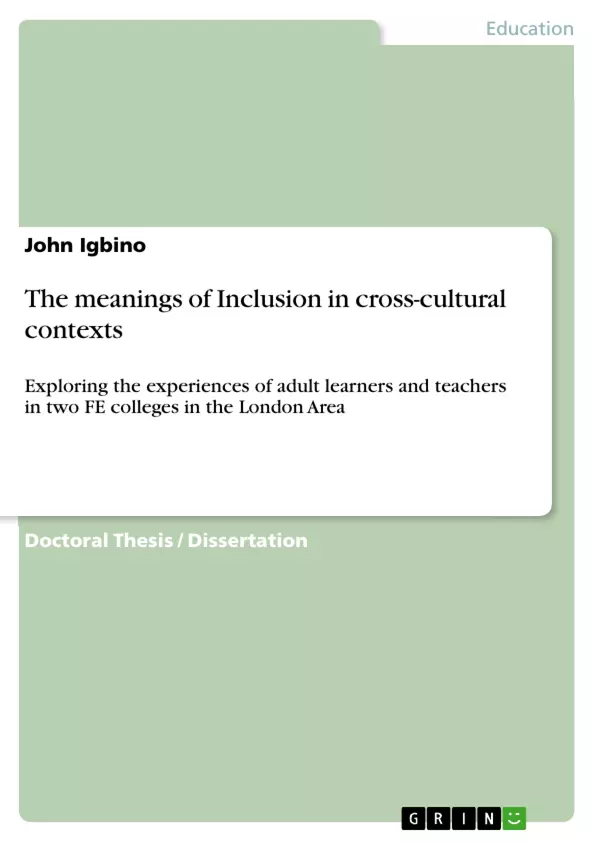The focus of the research in this thesis concerns the meanings of inclusion. The thesis explores the meanings of inclusion within the post-compulsory education policy subsystem of the national education policy system. The thesis uses ethnographic analysis of policy documents, ethnographic interviews and surveys to explore the meanings of inclusion and the experiences of learners, teachers, College policy-makers, curriculum managers and course co-ordinators together with the factors that influence those meanings and experiences in the cross-cultural contexts of further education colleges. The thesis begins with a critical review of theoretical models of inclusion before embarking on historical explorations of the evolution of inclusive policy 1945 – 2010 and thence the meanings of inclusion from the perspectives of adult learners, teachers, College policy-makers, curriculum managers and course co-ordinators.
From the results of the analysis of ethnographic interviews, surveys and documents it was found that the meanings of inclusion, the experiences of inclusion and the factors that influenced these meanings and experiences were varied and contested. The thesis argues that irrespective of the variability and contests there is a common thread running through the various meanings. The common thread which the thesis argues runs through the meanings centre on the answers to the question: inclusion into what? It was found that colleges manipulate and adjust learners to curricular programmes in order to meet the recruitment, retention, achievement, and progression targets set by the Learning and Skills Council (LSC).
The thesis argues that the physical environment and the layout and the level of technology and teaching aids in the classroom are not material to the meanings of inclusion to adult learners and teachers. Instead the thesis creates new arguments based on four behavioural, principles namely, Honesty, Order, Obedience and Diligence (HOOD), concerning the centrality of primary educational goals, primary, secondary and circumstantial educational factors to the meanings of inclusion. The thesis defines how ethical dilemmas have led to perceptive distortions of the professional identity of teachers.
Inhaltsverzeichnis (Table of Contents)
- Introduction
- Theories of Inclusion
- Inclusion: A Historical Perspective
- Research Methodology
- Findings
- Conclusions and Implications
Zielsetzung und Themenschwerpunkte (Objectives and Key Themes)
This thesis examines the meanings of inclusion within the context of post-compulsory education in the UK, focusing specifically on the experiences of adult learners and teachers in two further education colleges in London. The research explores the complex interplay between policy, practice, and individual perceptions of inclusion, considering how these factors shape the experiences of learners and teachers in cross-cultural settings.- The diverse meanings of inclusion and how they are interpreted by learners, teachers, and policymakers.
- The impact of institutional policies and practices on inclusion and the extent to which they align with theoretical models of inclusion.
- The role of individual experiences and perspectives in shaping the meanings of inclusion.
- The influence of cross-cultural contexts on the meanings of inclusion.
- The implications of findings for policy and practice in post-compulsory education.
Zusammenfassung der Kapitel (Chapter Summaries)
- Introduction: This chapter sets the context for the research by outlining the key concepts and research questions that will be explored in the thesis. It also provides a brief overview of the research methodology and the theoretical framework used in the study.
- Theories of Inclusion: This chapter critically reviews existing theoretical models of inclusion, exploring their strengths and limitations in relation to the context of post-compulsory education. It examines different perspectives on inclusion, including social, cultural, and educational perspectives.
- Inclusion: A Historical Perspective: This chapter traces the historical development of inclusive policies in the UK, focusing on the evolution of policies related to post-compulsory education from 1945 to 2010. It analyzes the key policy shifts and the factors that influenced their development.
- Research Methodology: This chapter presents a detailed account of the research methodology used in the study, including the research design, data collection methods, and data analysis techniques. It explains the rationale behind the choice of research methods and the specific approaches adopted for data analysis.
- Findings: This chapter presents the findings of the research, drawing on data from ethnographic interviews, surveys, and document analysis. It examines the diverse meanings of inclusion, the experiences of inclusion among learners and teachers, and the factors that influence these meanings and experiences.
Schlüsselwörter (Keywords)
This study focuses on the meanings of inclusion in the context of post-compulsory education, drawing upon the experiences of adult learners and teachers in two further education colleges in London. The research highlights the influence of policy, practice, individual perceptions, and cross-cultural contexts on the concept of inclusion. Key terms include: inclusion, post-compulsory education, adult learners, teachers, policy analysis, cross-cultural contexts, ethnographic research, qualitative research, and the Learning and Skills Council (LSC).Frequently Asked Questions
What are the "HOOD" principles in education?
HOOD stands for Honesty, Order, Obedience, and Diligence. These are behavioral principles identified as central to the meanings of inclusion for learners and teachers.
How do colleges define inclusion in practice?
Research shows that colleges often define inclusion by adjusting learners to curricular programmes to meet recruitment and retention targets set by funding bodies like the LSC.
Does technology impact the feeling of inclusion?
The thesis argues that the physical environment and technology levels are not as material to the meaning of inclusion as behavioral and educational factors.
What is the "Learning and Skills Council" (LSC)?
The LSC was a national body responsible for funding and planning post-compulsory education and training in England, influencing inclusion through performance targets.
What methodology was used in this research?
The study used an ethnographic approach, including analysis of policy documents, ethnographic interviews, and surveys with learners and teachers.
How has inclusive policy evolved in the UK?
The research explores the evolution of policy from 1945 to 2010, tracing how the concept of inclusion has shifted in the national education system.
- Quote paper
- John Igbino (Author), 2010, The meanings of Inclusion in cross-cultural contexts , Munich, GRIN Verlag, https://www.grin.com/document/191654



